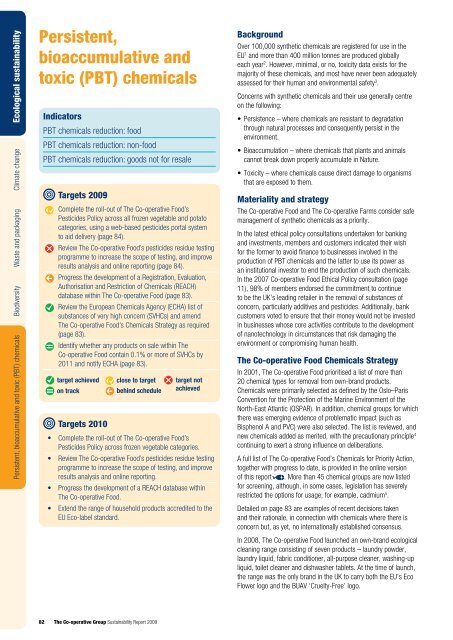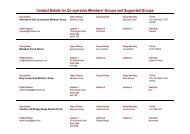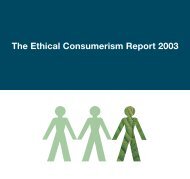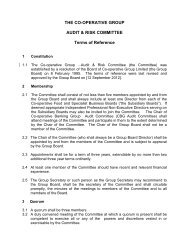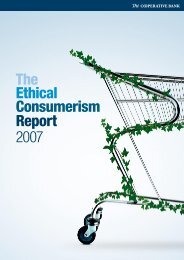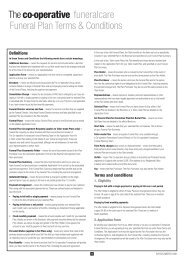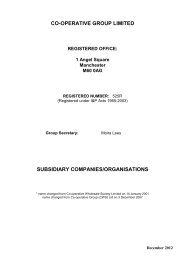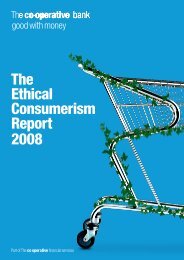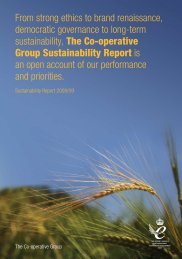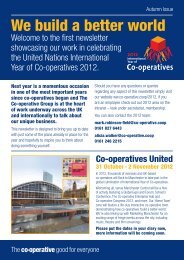Sustainability Report 2009 - The Co-operative
Sustainability Report 2009 - The Co-operative
Sustainability Report 2009 - The Co-operative
You also want an ePaper? Increase the reach of your titles
YUMPU automatically turns print PDFs into web optimized ePapers that Google loves.
Persistent, bioaccumulative and toxic (PBT) chemicals Biodiversity Waste and packaging Climate change Ecological sustainability<br />
Persistent,<br />
bioaccumulative and<br />
toxic (PBT) chemicals<br />
Indicators<br />
PBT chemicals reduction: food<br />
PBT chemicals reduction: non-food<br />
PBT chemicals reduction: goods not for resale<br />
Targets <strong>2009</strong><br />
<strong>Co</strong>mplete the roll-out of <strong>The</strong> <strong>Co</strong>-<strong>operative</strong> Food’s<br />
Pesticides Policy across all frozen vegetable and potato<br />
categories, using a web-based pesticides portal system<br />
to aid delivery (page 84).<br />
Review <strong>The</strong> <strong>Co</strong>-<strong>operative</strong> Food’s pesticides residue testing<br />
programme to increase the scope of testing, and improve<br />
results analysis and online reporting (page 84).<br />
Progress the development of a Registration, Evaluation,<br />
Authorisation and Restriction of Chemicals (REACH)<br />
database within <strong>The</strong> <strong>Co</strong>-<strong>operative</strong> Food (page 83).<br />
Review the European Chemicals Agency (ECHA) list of<br />
substances of very high concern (SVHCs) and amend<br />
<strong>The</strong> <strong>Co</strong>-<strong>operative</strong> Food’s Chemicals Strategy as required<br />
(page 83).<br />
Identify whether any products on sale within <strong>The</strong><br />
<strong>Co</strong>-<strong>operative</strong> Food contain 0.1% or more of SVHCs by<br />
2011 and notify ECHA (page 83).<br />
target achieved<br />
on track<br />
Targets 2010<br />
close to target<br />
behind schedule<br />
target not<br />
achieved<br />
• <strong>Co</strong>mplete the roll-out of <strong>The</strong> <strong>Co</strong>-<strong>operative</strong> Food’s<br />
Pesticides Policy across frozen vegetable categories.<br />
• Review <strong>The</strong> <strong>Co</strong>-<strong>operative</strong> Food’s pesticides residue testing<br />
programme to increase the scope of testing, and improve<br />
results analysis and online reporting.<br />
• Progress the development of a REACH database within<br />
<strong>The</strong> <strong>Co</strong>-<strong>operative</strong> Food.<br />
• Extend the range of household products accredited to the<br />
EU Eco-label standard.<br />
Background<br />
Over 100,000 synthetic chemicals are registered for use in the<br />
EU 1 and more than 400 million tonnes are produced globally<br />
each year 2 . However, minimal, or no, toxicity data exists for the<br />
majority of these chemicals, and most have never been adequately<br />
assessed for their human and environmental safety 3 .<br />
<strong>Co</strong>ncerns with synthetic chemicals and their use generally centre<br />
on the following:<br />
• Persistence – where chemicals are resistant to degradation<br />
through natural processes and consequently persist in the<br />
environment.<br />
• Bioaccumulation – where chemicals that plants and animals<br />
cannot break down properly accumulate in Nature.<br />
• Toxicity – where chemicals cause direct damage to organisms<br />
that are exposed to them.<br />
Materiality and strategy<br />
<strong>The</strong> <strong>Co</strong>-<strong>operative</strong> Food and <strong>The</strong> <strong>Co</strong>-<strong>operative</strong> Farms consider safe<br />
management of synthetic chemicals as a priority.<br />
In the latest ethical policy consultations undertaken for banking<br />
and investments, members and customers indicated their wish<br />
for the former to avoid finance to businesses involved in the<br />
production of PBT chemicals and the latter to use its power as<br />
an institutional investor to end the production of such chemicals.<br />
In the 2007 <strong>Co</strong>-<strong>operative</strong> Food Ethical Policy consultation (page<br />
11), 98% of members endorsed the commitment to continue<br />
to be the UK’s leading retailer in the removal of substances of<br />
concern, particularly additives and pesticides. Additionally, bank<br />
customers voted to ensure that their money would not be invested<br />
in businesses whose core activities contribute to the development<br />
of nanotechnology in circumstances that risk damaging the<br />
environment or compromising human health.<br />
<strong>The</strong> <strong>Co</strong>-<strong>operative</strong> Food Chemicals Strategy<br />
In 2001, <strong>The</strong> <strong>Co</strong>-<strong>operative</strong> Food prioritised a list of more than<br />
20 chemical types for removal from own-brand products.<br />
Chemicals were primarily selected as defined by the Oslo–Paris<br />
<strong>Co</strong>nvention for the Protection of the Marine Environment of the<br />
North-East Atlantic (OSPAR). In addition, chemical groups for which<br />
there was emerging evidence of problematic impact (such as<br />
Bisphenol A and PVC) were also selected. <strong>The</strong> list is reviewed, and<br />
new chemicals added as merited, with the precautionary principle 4<br />
continuing to exert a strong influence on deliberations.<br />
A full list of <strong>The</strong> <strong>Co</strong>-<strong>operative</strong> Food’s Chemicals for Priority Action,<br />
together with progress to date, is provided in the online version<br />
of this report . More than 45 chemical groups are now listed<br />
for screening, although, in some cases, legislation has severely<br />
restricted the options for usage; for example, cadmium 5 .<br />
Detailed on page 83 are examples of recent decisions taken<br />
and their rationale, in connection with chemicals where there is<br />
concern but, as yet, no internationally established consensus.<br />
In 2008, <strong>The</strong> <strong>Co</strong>-<strong>operative</strong> Food launched an own-brand ecological<br />
cleaning range consisting of seven products – laundry powder,<br />
laundry liquid, fabric conditioner, all-purpose cleaner, washing-up<br />
liquid, toilet cleaner and dishwasher tablets. At the time of launch,<br />
the range was the only brand in the UK to carry both the EU’s Eco<br />
Flower logo and the BUAV ‘Cruelty-Free’ logo.<br />
82<br />
<strong>The</strong> <strong>Co</strong>-<strong>operative</strong> Group <strong>Sustainability</strong> <strong>Report</strong> <strong>2009</strong>


